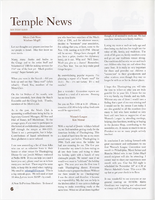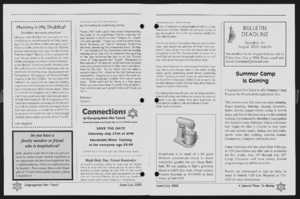Search the Special Collections and Archives Portal
Search Results

Interview with Stuart C. Black, February 21, 2006
Date
Archival Collection
Description
Text

Meeting minutes for Consolidated Student Senate, University of Nevada, Las Vegas, September 20, 2004
Date
Archival Collection
Description
Text
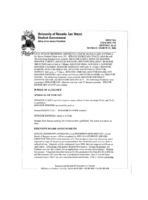
Meeting minutes for Consolidated Student Senate, University of Nevada, Las Vegas, March 22, 2004
Date
Archival Collection
Description
Text
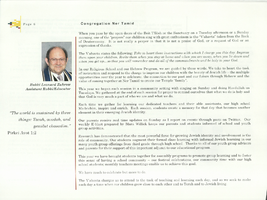
Annual report from Congregation Ner Tamid, 2010-2011
Date
Archival Collection
Description
Annual report from Congregation Ner Tamid, 2010-2011
Text

Juliana Urtubey oral history interview: transcript
Date
Archival Collection
Description
Oral history interview with Juliana Urtubey conducted by Nathalie Martinez and Barbara Tabach on May 24, 2021 for the Latinx Voices of Southern Nevada Oral History Project. Born in Colombia, Julia was able to immigrate with her family to the United States when she was six years old. The family lived in Chicago, Illinois and later in Phoenix, Arizona. Juliana moved to Las Vegas in 2013 and taught learners with special education needs at the elementary level. In 2021, she was named the National Teacher of the Year, the first Latina and the only Nevadan to ever hold the distinction. Juliana personally received the award from Dr. Jill Biden. Subjects discussed include: Colombia, Chicago, Illinois, National Teacher of the Year, and bilingual education.
Text

Transcript of interview with David Wasserman by Barbara Tabach, October 21, 2016
Date
Archival Collection
Description
For nearly two decades between 1950 and 1970, only one dentist of Jewish ancestry was known to be licensed to practice in Nevada. That was Dr. Joe Chenin. Finally, in 1971, the steadfast and easy mannered Dr. David R. Wasserman (1944 - ) broke through the barrier to become the second Jewish dentist serving the Las Vegas community. Over the following years, Dr. Wasserman built a sizeable following and immersed himself in the Jewish community of Las Vegas. Among his achievements is his participation and leadership in the formation of Las Vegas’ first Reform Jewish synagogue, Congregation Ner Tamid. He also would be active in the Jewish Federation. In 1992, as the HIV-AIDS epidemic affected dental offices throughout the nation, Dr. Wasserman saw an opportunity to get ahead of the infection. With the help of his wife Juanita Davis-Wasserman and his father-in-law Warren Davis, he developed, patented, manufactured and distributed a disposable tip for a treatment instrument commonly found in dental offices called a tri-syringe. This disposable tip brought sanitary options and great financial fortune to Dr. Wasserman and his family. In this oral history, Dr. Wasserman reflects on his joy of living in Las Vegas. He is a highly regarded dentist and leader in the Jewish community.
Text

Ellen Barre Spiegel interview, December 4, 2017: transcript
Date
Archival Collection
Description
Ellen Barre Spiegel grew up in Jericho NY, a predominantly Jewish town in Long Island. Her ancestors had migrated to the United Sates prior to the outbreak of World War II. And for much of life her exposure to cultural diversity was limited. Ellen was born in 1962. She attended Cornell University, located in upstate New York, and graduated in 1984. Though the student population was 30% Jewish, the university expanded her knowledge of the world: her Protestant roommate explained that she had never met a Jew and Ellen replied, I have never met a WASP. Her college studies centered on consumer economics and she was a public policy major. Ellen was an early adopter of technology and her career path included positions at American Express, Prodigy (a joint venture of IBM and Sears), the Weather Channel, and Manufacturers Hanover Trust. Each company used her increasing experience with using technologies to improve connections with consumers. Ellen describes her Jewish identity as conservative and is a member of Midbar Kodesh Temple in Henderson. She talks about her bat mitzvah and her move back to New York to recite the mourner’s Kaddish for the year following the passing of her father. Later, she moved to Santa Monica, where she met Bill, her husband, using a new dating site called Luvitt AOL. After marriage, the couple saw financial advantages to living in Las Vegas and relocated their business and home to the valley in 2001. Soon Ellen noted that there was no active Democratic Club in Henderson and it became her mission to reignite the club. This launched a long list of political and civic accomplishments for Ellen. She has been an assemblyperson in the Nevada legislature (2008, 2013-2017). Her list of accomplishments and affiliations are on pages 46-47.
Text
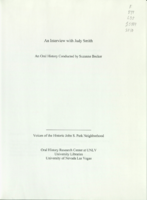
Transcript of interview with Judy Smith by Suzanne Becker, November 22, 2008
Date
Archival Collection
Description
Judy Smith was a teenager when her family relocated from Barstow, CA to Las Vegas in 1958. It was a wide open setting, an ideal location for riding her horse. It was also an era of growth as the city became a gambling destination and the Strip became dotted with early casinos and hotels. Judy attended Las Vegas High School, worked for the Las Vegas Sun and earned a scholarship to UNR. By 1967, she was married and moving back to Vegas with her young family. They chose the John S. Park Neighborhood as the place to call home. For Judy living in John S. Park is about a "sense of place" and "a sense of timelessness." She describer the evolution of the neighborhood and the greater Las Vegas community from the pioneers to the contemporary leaders. In 2006, Judy's home was gutted by a fire. Her life was saved by an observant neighbor. She could have relocated at the time, but chose not to move from the area that she has called home for over 40 years.
Text

